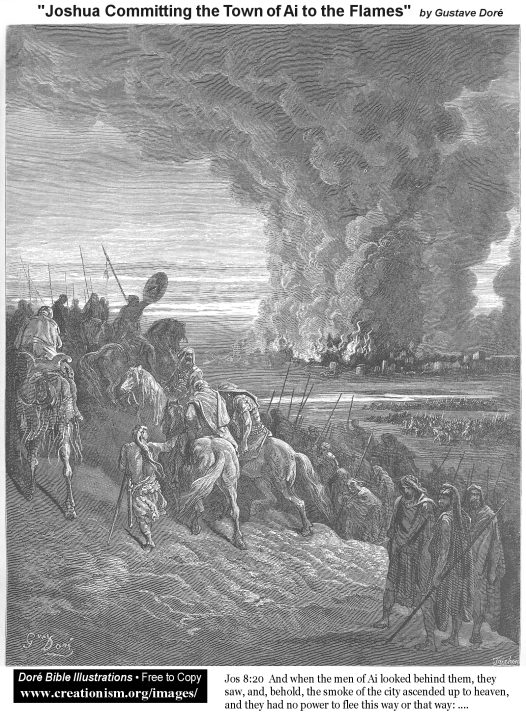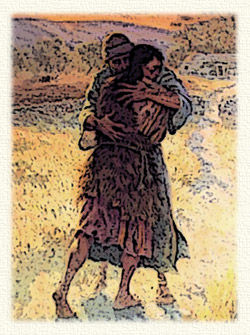
We saw in our last posting that Israel's defeat at Ai was due to her failure to ensure that all her members observed the command of God regarding not taking plunder-human or otherwise. This does not mean, of course, that Israel did not make other mistakes as well from a realistic military point of view. The Israeli scholar Abraham Malamat has correctly observed:
"From a realistic-military viewpoint, the 'transgression' was a breakdown in discipline at the time of the conquest of Jericho, that is, Achan's taking of loot which was under divine ban. The glory at Jericho resulted in an over-confidence which infected the Israelite command no less than the ranks; in the sphere of intelligence, this was manifest in the gross underestimation of the enemy. However, the setback at Ai had a sobering effect upon the Israelites. But Joshua seems to have been concerned less by the drop in Israelite morale than by an external factor of extreme significance: The fear of loss of image (note the indicative words attributed to Joshua in 7:8-9) led him to react swiftly with a force sufficiently large to assure an overwhelming victory" (History of Biblical Israel: Major Problems and Minor Issues [Boston: Brill, 2001] 78).
This time there would be no overconfidence and no underestimating Ai! Even the fearless and bold Joshua was afraid. Reassurance came from God:
"Do not be afraid; do not be discouraged. Take the whole army with you, and go up and attack Ai. For I have delivered into your hands the king of Ai, his people, his city and his land. 2 You shall do to Ai and its king as you did to Jericho and its king, except that you may carry off their plunder and livestock for yourselves. Set an ambush behind the city" (Joshua 8:1-2).
No halfhearted measures: Even though God promised to deliver the enemy city into their hands, Joshua is commanded to "take the whole army with you." He is also to use his wits (i.e., military strategy): "Set an ambush behind the city". We moderns think of ambushes as tactics of extremely small fighting forces. In fact, for many of us the very concept comes out of movies about the Old West! Yet ambushes were often employed even by major imperial armies, such as the Hittites. Other tactics known in ancient Near Eastern military descriptions include forced night marches to permit early morning surprise attacks, and even nighttime attacks such as we see in the exploits of Gideon (Judges 7). The Bible's portrayal of military operations is perfectly in accord with what we know from sources outside the Bible and contemporary with the events of the biblical narratives.
This time God would allow the Israelite soldiers to take personal plunder from the enemy city (v. 2). "Do not muzzle the ox while it is treading out the grain" - Deut. 25:4; "The worker deserves his wages" - Luke 10:7; both verses cited in 1 Timothy 5:18 to justify the preacher's right to receive support.
The "ban" was not a permanent feature of the Israelite conquest of the Promised Land: it only applied under special circumstances, of which Jericho is a prime example. Nor did wholesale burning of conquered cities apply: Jericho and Ai (v. 8) were among the few exceptions. For this reason it is irrelevant if skeptical archeologists claim no evidence for the Israelite conquest, since the kind of evidence that excavations would show would only be ash layers in the tells, whereas the biblical accounts in Joshua attest burning of only a very few cities.
Rather the norm of Israelite conquest is nicely expressed as follows:
"So I gave you a land on which you did not toil and cities you did not build; and you live in them and eat from vineyards and olive groves that you did not plant.'" (Joshua 24:13 NIV).
Israel simply took over structures already in existence!
God instructed Joshua to use an ambush, but he allowed the man to develop his own detailed plan, which we read about in verses 3-9.
You may wonder what is meant by "behind the city" (e.g., v. 14). Does a city have a front and a back? Chicago, New York, Boston, Atlanta and Knoxville may not have a front or a back, but in ancient times walled cities such as Jerusalem, Nineveh, Babylon, Troy and Hattusa, had a front, where the main gate was located, and the back was on the opposite side. The king of Ai and his troops marched out of the main gate and headed for the main body of Israelite troops in the valley to the north and east (vv. 14-17). The commando units in ambush were "behind the city" on the west side, where he could not see them!

Once the ambush forces seized and set the city on fire, the troops of Ai were caught in a pincers movement between the two Israelite bodies and were cut down by the Israelites (v. 20-23). Following God's orders, the troops took no prisoners, only delivering the King of Ai to Joshua (v. 24-29).
Ai symbolized a defeat of God's people that needed to be emphatically erased from memory. That was undoubtedly why God gave orders that no one from the city was to survive.
Sometimes we experience moral failures that not only shame ourselves, but threaten to erase our effectiveness as ministers of Christ's love to others. We need not only to ask God's forgiveness for these failures, but also take drastic and extreme steps to prevent their recurrence in our personal lives. Sometimes, if your failure involves another person, you need to make an apology to that person and share with him or her your determination never to allow this to happen again.
It is humiliating to have to admit your failures not only to God and to yourself, but also to another person. God does not ask you to share this information with persons not directly involved. But those who do know, must also know your repentence. Although this can be very humbling and embarrassing, there can also be joy that comes from such asking for forgiveness. New bonds of friendship and even of mutual prayer can arise from the ash heaps of your repentance.
 This too is a gift of God's grace. This can be a Joshua moment.
This too is a gift of God's grace. This can be a Joshua moment.
No comments:
Post a Comment